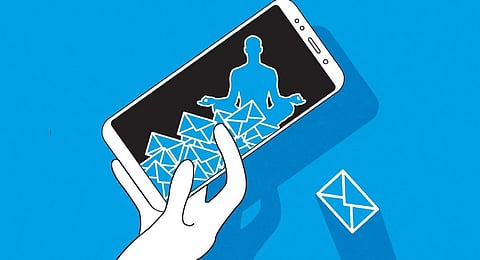

Don Knuth is a Professor Emeritus at Stanford University and recipient of the Turing Award (considered the Nobel Prize of computer science). Among other books, he is the author of The Art of Programming, which concludes with a blurb from Bill Gates: “You should definitely send me a résumé if you can read the whole thing.” Knuth pays people to find mistakes in his books, has a wager on whether Google co-founder Sergey Brin will finish his PhD, and recently quipped, “It started out that computer scientists were worried nobody was listening to us. Now I’m worried that too many people are listening.”
The most surprising thing about Knuth is that he abandoned email in 1990. He says, “It seems to me that 15 years of email is plenty for one lifetime. Email is a wonderful thing for people whose role in life is to be on top of things. But not for me; my role is to be on the bottom of things. What I do takes long hours of studying and uninterruptible concentration. I try to learn certain areas of computer science exhaustively; then I try to digest that knowledge into a form that is accessible to people who don’t have time for such study.” For most of us, imagining life without emails and chat platforms seems impossible.
We need to keep connected to get work done, but we overplay the importance of being in touch. In order to be effective, we need some solitude. If we are constantly responding to others, we fail to listen to our own voice and end up spending most of our time responding and reacting to things. In other words, we don’t set our agenda. Other people do. Their priorities become our priorities. Their goals become our goals, and we end up in a dizzying state of unending work. We should take a leaf from Knuth’s approach and develop a better relationship with communication platforms. Communicating with others is important, but to be in contact with our own selves is vital. Henry David Thoreau didn’t write Walden as an exercise in withdrawal, but rather as an enthusiastic endorsement of finding oneself in the company of one’s thoughts.
We are primed to connect with others, network, post online, and build in public. There is pressure to be in touch with what is going on around us and it has some advantages. It, however, also leads to a strange vacuum of original ideas. We are so in sync with others that we lose sight of our own selves. The truth is that solitude and leadership go hand in hand. Leaders have this challenge of listening to others, connecting with others, yet producing something different. That is only possible if they carve out time for quiet.
William Deresiewicz writes leadership means finding a new direction, not simply putting yourself at the front of the herd that’s heading toward the cliff. He says, “However many people you may consult, you are the one who has to make the hard decisions. And at such moments, all you really have is yourself.” Solitude needs to be carved out in today’s work life. There will always be something to attend to, something to indulge in, something to put in place. Together they create an attention crisis that results in an originality crisis. We become the average of everything we get distracted by.
Carving solitude starts by committing to do nothing for a period of time every single day. It is hard because we are primed to be busy. Most people on social media are now self-proclaimed productivity gurus. They teach us ways to seize the day with the help of shiny gadgets, tantalising hacks and questionable diets. Even mediation has become a performative act. We are taught to meditate and then flaunt on social media.
This obsession with overcommunicating everything all the time can be dangerous. In addition to killing privacy, it forces us to enter an unwinnable race to hustle more. Unfortunately, it doesn’t lead to anything for most of us. There is no award for being busy for the heck of it. Knuth was able to do the work he did because he chose depth of work over the illusion of hustle. We may not be able to abandon email altogether, but if we fail to change our relationship with it, we will struggle to do work that matters.
Utkarsh Amitabh
CEO, Network Capital; Chevening Fellow, University of Oxford
Twitter: @utkarsh_amitabh